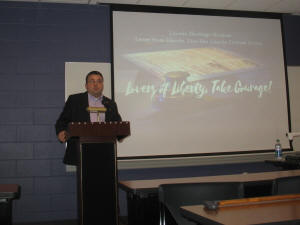|
Dr.
Wheeler shared the story of Elijah P. Lovejoy, an Illinois
abolitionist, Presbyterian minister, and newspaper editor who was
murdered by a pro-slavery mob in Alton, Illinois.

Lincoln Heritage Museum Director Tom McLaughlin introduced Dr.
Wheeler. Wheeler is the Illinois State Historian and serves as the
Director of research, collections, and library services at the
Abraham Lincoln Presidential Library and Museum in Springfield.
Wheeler specializes in the history of Illinois, the Civil War era,
and the life and legacy of Abraham Lincoln, and is the historian of
record for the state's 56 historic sites.

As Wheeler began his “Learn from Lincoln, Live like Lincoln” talk,
he said, "Using Lincoln's life for inspiration is a very cool
concept."

Wheeler said most textbooks tell us that in 1837, Lovejoy became a
martyr of free speech, freedom of the press, and abolitionism.
Lovejoy's murder demonstrated how slavery affected everyone even in
free states like Illinois.
He said Abraham Lincoln confronted the horror of Lovejoy's murder,
realizing slavery had the power to absolutely destroy the American
experiment in popular government.
Wheeler said Texas Tech University has a collection of Lovejoy
letters and Paul Simon wrote a book about Lovejoy called Freedom's
Champion. Both give insight into Lovejoy's life.
Elijah Lovejoy was born November 9, 1802 in Albion, Maine and was
the oldest in a family of nine children whose father was a devout
Presbyterian minister. Lovejoy grew up in the "heart" of the second
"Great Awakening," where people were taught to be on the lookout for
sin and attack it.
Wheeler said this period led to many reform movements such as
temperance, women's rights, education reform, prison reform, and
abolitionism. Some saw slavery as a sin against God and wanted to do
everything they could to stop it.
Wheeler said Lovejoy's letters included poetry and allusions to
classic literature. Lovejoy was a well- educated man who graduated
valedictorian of his class at Waterville College in Maine.

In 1827, Lovejoy decided to travel west, initially ending up in
Hillsboro, Illinois, but feeling there was little opportunity there.
Lovejoy decided St. Louis, Missouri was the place for him and in
1830, he purchased half of the St. Louis Times, a pro-Henry Clay
newspaper which spoke against Andrew Jackson. Lovejoy edited the
paper for two years, rarely talking about slavery.
Wheeler said Lovejoy "poured out his heart" in letters to his
parents. Not having a "sincere level of religiosity" was a source of
anxiety for Lovejoy. Lovejoy told his parents he had not had a true
conversion experience or felt "the hand of God" on him in what to do
in his life. After attending a revival in 1832 and hearing Reverend
David Nelson speak about abolitionism, encouraging the audience to
take a stand against slavery, Lovejoy's life changed.
Wheeler said Lovejoy wrote to his parents about bringing his sins
and sorrows to Jesus and professing his faith, telling them God came
down and let him know his purpose. This experience changed the
"entire direction" of Lovejoy's life.
Wheeler said Lovejoy befriended Reverend Nelson, who convinced him
to enter the ministry. Lovejoy enrolled in Princeton Theological
Seminary, graduating as valedictorian.
Wheeler said after graduation, Lovejoy went back to St. Louis and
sold his half of the St. Louis Times, then started the St. Louis
Observer. Lovejoy was now a minister who used his new paper as a
pulpit against alcohol, tobacco, and Catholicism. Lovejoy felt
Catholics posed a threat to America, saying they did what the Pope
told them to do and voting how the Pope wanted them to vote. Lovejoy
worried the Pope could become hostile and tell Catholics overthrow
the government.

Wheeler said by 1834, Lovejoy began to write editorials speaking
against slavery, calling it "unnatural" and "repugnant" to the
principles of liberty. Lovejoy wondered how people could live with
hypocrisy when the constitution professed all men are created equal.
Wheeler said Lovejoy was threatened with tar and feathering, and
violence, and one newspaper said a mob should destroy his printing
press. Even Lovejoy's friends told him to tone it down, but he
became even more outspoken because he said he had freedom of the
press.
Wheeler said in St. Louis in 1836, a free black man named Francis
McIntosh was asked by two police officers to help take sailors
involved in a skirmish into custody. McIntosh refused and was
arrested. When told he faced five years in jail, McIntosh stabbed
and killed one officer and wounded the other.
Wheeler said a mob broke into the jail and took McIntosh to the edge
of town, chaining him to a tree, gathering wood under his feet, and
lighting a fire. McIntosh died within twenty minutes. The next day,
kids threw rocks at McIntosh's charred corpse trying to break his
skull open.
Wheeler said Lovejoy wrote an editorial condemning the mob's "savage
barbarity." When a grand jury was convened, Judge Luke Edward
Lawless said lynching was horrible, but felt there were too many
involved to prosecute. Lawless read Lovejoy's "anti-slavery
rhetoric" and said people like Lovejoy should be held accountable
for these actions.
Wheeler
said Lovejoy then faced more death threats and decided move to
Alton, Illinois to set up shop. Before Lovejoy left, a mob destroyed
his printing press and threw it into the Mississippi River. Then,
another printing press was thrown into the river by a mob from
Missouri before he was able to set up shop in Alton. People in Alton
were concerned about Lovejoy's writings, but at a meeting, Lovejoy
said he was at liberty to speak, write, and publish whatever he
pleased.

Wheeler said in 1837, Illinois Governor Joseph Duncan was asked by
Southern states to condemn abolitionists. The legislature formed a
committee to look into the issue and came up with resolutions to
condemn abolitionists and abolitionist societies, to support slave
owners in the south, and to not ban slavery. The Illinois House of
Representatives voted 77-6 and the Senate voted 18-0 for the
resolutions.
[to top of second column] |

Wheeler said Abraham Lincoln was one of the six
voting against the resolutions. Lincoln said he was anti-slavery,
but said abolitionists tended "to increase rather than abate its
evils."
Wheeler said Lovejoy continued to speak against slavery, saying not
fighting against slavery was fighting against God himself. Lovejoy
finally declared himself an abolitionist. He was ordered to stop the
writings, but just became more defiant. Another printing press was
thrown into the river, and Lovejoy became even more defiant.
Wheeler said Lovejoy wanted to raise funds for a new printing press
and got support from Illinois College President Edward Beecher,
brother to Harriet Beecher Stowe. Beecher and Lovejoy formed an
anti-slavery group and had a convention. Pro-slavery people showed
up to disrupt the convention, shouting Lovejoy down when he spoke.
They also tried to stop the society and Lovejoy's purchase of a new
printing press.
Wheeler said Lovejoy was told by city leaders not to publish another
newspaper and asked to leave Alton. Lovejoy continued to speak of
his rights to free speech and press. Lovejoy had convictions he was
willing to die for.
In November 7, 1837, Lovejoy's fourth printing press was delivered.
Nineteen supporters were there to protect Lovejoy, but a mob showed
up throwing rocks and trying to set the building's roof on fire. One
of Lovejoy's supporters shot and killed someone in the mob.

Wheeler said a rifleman shot Lovejoy five times, killing him. The
printing press was then destroyed. Lovejoy was buried on his 35th
birthday in an unmarked grave, and no service was held. No one was
ever held accountable for Lovejoy's murder, though four persons
claimed they shot him.
Wheeler said Lovejoy became a martyr for the abolition movement and
some said his murder represented a threat to America. Many were
incensed and decried his murder. One Ohio preacher said a crisis had
come and asked his congregation to condemn slavery and raise money
for a new printing press. A man in the back named John Brown said he
would consecrate his life to speak against slavery.
Wheeler said three months later, Lincoln spoke on the "Perpetuation
of our Political Institutions," reminding citizens of their duty to
"preserve our form of government" and "to hand it over to the next
generation and to teach them how revolutionary and how important
self-government is." Lincoln said there was a threat to the system
by not staying vigilant and ignoring laws and cited the rising tide
of mob violence, vigilante justice, the McIntosh lynching, and
Lovejoy's murder.
Wheeler said Lincoln felt people were taking the laws for granted
and told them the scene could be set for a tyrant to step forward as
a new king, causing them to lose everything they gained in the
revolution. Lincoln asked his audience to rededicate themselves to
the rule of "cold, calculating, unimpassioned reason" and "make
respect for the rule of law your political religion."
Wheeler said the point was that to Lincoln and his neighbors in
Illinois, Lovejoy's murder shook them "to the core." The murder
represented that slavery was not an abstract issue, but affected
even those in free states. The murder demonstrated how evil slavery
was, threatening fundamental rights and government. As President,
Lincoln said slavery caused the Civil War.

Wheeler said Lovejoy is now listed at the top in every journalism
hall of fame for becoming a martyr to fundamental rights.
Wheeler said Lovejoy's murder made Alton an infamous town for a
while. Beecher called Alton a microcosm of America. Lovejoy, the
main agitator, was from New England, and those who killed him, had
more in common with their friends from the south. Alton was just a
stage for the American tragedy to play out.

Wheeler then asked the audience for questions and comments.
One audience member said Lincoln and Lovejoy were both martyrs for
the cause.
Wheeler said Lovejoy's death was a key ingredient to the coming
Civil War. Lincoln became a martyr for the cause of civil rights. A
statue in Alton now marks Lovejoy's final resting place, and the
people of Alton embrace his place in their history. Lovejoy's
brother Owen also became an abolitionist who sided with Lincoln.
Another audience member asked what happened to his widow and
children?
Wheeler said Lovejoy's widow married one of his defenders. One child
died soon after Lovejoy's death, but the other lived to adulthood
and became a publisher. Some distant family members are still
interested in social causes.

Another question was about why Sangamon County voted no on the
thirteenth amendment abolishing slavery.
Wheeler said it was likely about demographics with some settlers to
the county coming from Southern states and others coming from New
England. Central Illinois had a mix of these cultures and was a
microcosm of the country at large.
Anne Moseley asked about the Alton Lyceum notebook and how it was
involved in Lovejoy's actions?
Wheeler said Lovejoy was a founder and leader of the group that
discussed issues confronting them, but they were silent upon his
death.

To close out the evening, Moseley, Lincoln Heritage Museum's
Assistant Director and Curator, thanked everyone for coming to the
last lecture in the 2017 series. She said 2018's lecture series will
focus on letting us do our duty: Lincoln and Citizenship.
Moseley said next year is also Illinois' Bicentennial year.
[Angela Reiners] |